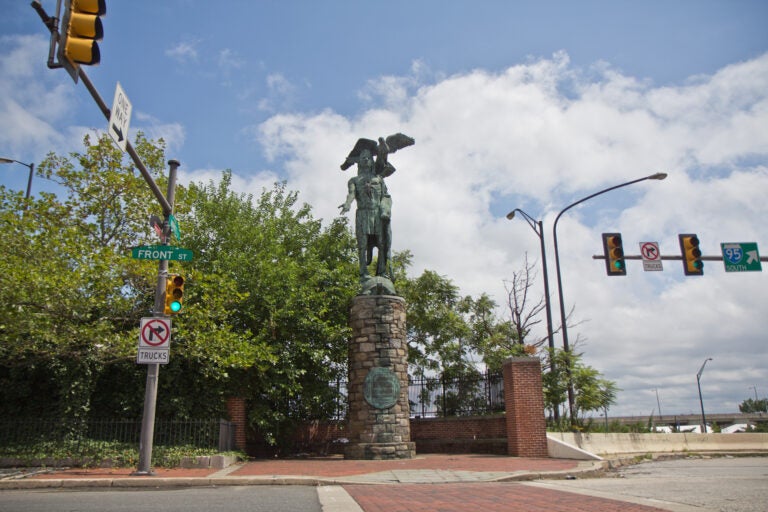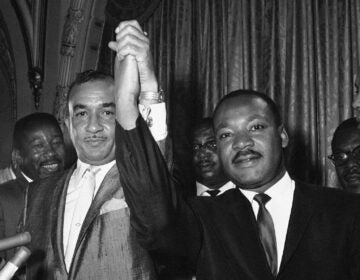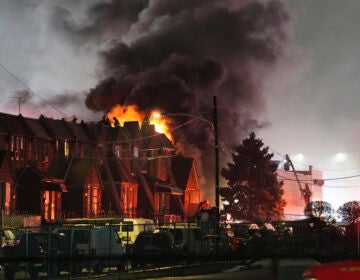Philly’s missing monuments to Native history
As a city commission decides the fate of the Christopher Columbus in South Philly, it's sparking conversations about how the city could do more to represent Native people.
Listen 15:40
Lenape Chief Tamanend looking West from Front and Market Street. (Kimberly Paynter/WHYY)
As the city’s Art Commission decides the fate of the Christopher Columbus statue in South Philly this Wednesday, it’s sparked a bigger conversation about who is memorialized. Philadelphia is filled with historical markers and monuments honoring mostly white men claiming to have built the nation — but a big piece of that history is not well represented.
Morgan Ridgway, who is Black and Lenape, grew up in West Philly and studies the region’s Indigenous history as a PhD candidate at the University of Illinois at Urbana-Champaign. And he’s questioning why a city that takes pride in being the birthplace of America has done so little to memorialize the Native people who were here long before Columbus, and why he’s optimistic the city can do better.

Hear the whole story on The Why
Interview highlights
On pushing back on what he learned in school
We talked sort of generally about Indigenous histories. And it’s often in this kind of, “There used to be Indigenous people here.” And then there’s sort of like three options, right? That everyone was killed, that everyone moved somewhere else, and no one exists like in the present moment and if they do, they’re all like somewhere else, like maybe in Oklahoma or maybe sort of on a reservation. Like those are kind of the three major tracks, I think. And my schooling, which ended up getting me in trouble because I was a, let’s say, opinionated child.
I want to say it’s second or third grade and we’re talking about teepees and pueblos and “these were the Indian wars and now everyone’s gone.” And I remember being really adamant that that wasn’t true. And I remember being like, “Well, that’s not my family. Those aren’t my grandparents. That’s not my aunt. Why are you telling me this?” You’re not supposed to talk back to teachers and so I got trouble.
I remember going home and tell my mom about it and looking back on it, it was, I think, to kind of protect me in school. But for her, she was like, “You know who you are. You know where your family’s from. You know what our history is. But you also know that this is school and I want you to do well. So you have to, like, give them the right answers.” And so for her, it was kind of like teaching me to double think in school. There’s a version of Indigenous history that doesn’t map on to our reality. And I have to be able to, like, figure out that that’s different.
On removing the Christopher Columbus statue
I do think it does make a difference. Those statues are kind of representations of the idea that that Native people are dead, are dying, are not wanted or present, and to see that every day, it can be really demoralizing. This man (Columbus), who if we’re thinking about the history of things, he never set foot on this land mass. He certainly never was in Philadelphia. And he kind of ushered in this whole era of violence against Native people that is still going on today. When we’re talking about what we should memorialize or what statues should be where, we have to be really honest about who those people were, what happened, and what they brought with them. It’s not enough to say, “Well, they did one good thing.” They represented one person this way to kind of avoid the really hard truths that often are the case with people like Columbus … And unless we talk about that, I don’t think that they should really be there.
On the nation’s willingness to tell a more inclusive history
Maybe this is because I’m a perpetual optimist, but I think people are more willing to listen. We’re seeing statues come down, we’re seeing football team name changes. We’re seeing a lot of these really big conversations on like, how do we preserve history? Who counts and all of that? I think those conversations open up a possibility for reeducation.
To reeducate people, we have to support the communities who would teach us. So that means that this social change is about supporting Indigenous communities, supporting Black communities, saying, you know, your own histories. We are giving you the opportunity to reeducate us because of what we’ve been doing for tens of hundreds of years is not working. And I think we’re in a moment right now where … people are more willing to listen to the conversations we’re having around monuments and preservation of history are really about community building. And I think that’s the really beautiful thing.
WHYY is your source for fact-based, in-depth journalism and information. As a nonprofit organization, we rely on financial support from readers like you. Please give today.






